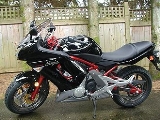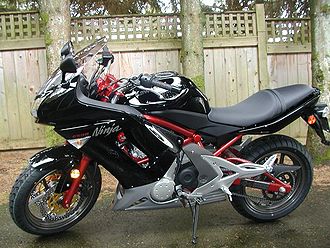
Kawasaki Ninja 650R
Encyclopedia
The faired Kawasaki Ninja 650R, also known as the ER-6f, and its un-faired sister model ER-6n were introduced in 2006 by Kawasaki. They are middleweight, parallel-twin engined motorcycles, designed for normal use on paved roads. They have modern styling and features, with low-seating ergonomics, a low center of gravity
, and respectable, manageable power output. The design was intended to appeal to a wide-ranging audience from newcomers to seasoned riders.
The engine is relatively unusual in employing a 180 degree crankshaft. This results in an uneven firing interval
(180 degrees, 540 degrees) which gives the engine note a distinctive "throbbing" quality.
The 650R/faired ER-6, known as the ER-6f overseas, was introduced to the market in 2006. The unfaired ER-6n was not sold in North America until the 2009 model year. The motorcycle fits above the Ninja 250R
and Ninja 500R
models, which already existed in Kawasaki's sportbike lineup, which includes the Ninja ZX models. For 2009, Kawasaki released an updated Ninja 650R which includes new bodywork, mirrors, gauges, lighting, and a new tune on the same 649 cc engine. The curb weight is reported as 440.9 lb (200 kg) instead of the previous dry weight of 393 lb (178.3 kg).
 In Europe the Ninja 650R is sold as the ER-6f ("f" denoting faired
In Europe the Ninja 650R is sold as the ER-6f ("f" denoting faired
) version of the ER-6, the "naked" roadster version is sold as the ER-6n. In 2009, Kawasaki introduced the ER-6n in the USA. The ER-6f differs slightly from the Ninja 650R as it features the passenger handlebars as standard (as does the ER-6n). In addition, the option of ABS brakes
were made available for both the ER-6n and ER-6f. There is also a derivative of the ER-6 called the Versys
which utilizes many of the same component parts as the Ninja 650R.
In many European countries the 6n naked version has proven considerably more popular than the ER-6f; however in other countries, such as Australia, the faired Ninja 650R has proven to be more popular than the un-faired ER-6n, becoming the most popular 'sports-tourer' in the Kawasaki lineup.
Center of mass
In physics, the center of mass or barycenter of a system is the average location of all of its mass. In the case of a rigid body, the position of the center of mass is fixed in relation to the body...
, and respectable, manageable power output. The design was intended to appeal to a wide-ranging audience from newcomers to seasoned riders.
The engine is relatively unusual in employing a 180 degree crankshaft. This results in an uneven firing interval
Big-bang firing order
A big bang engine is an unconventional motorcycle engine designed so that most of the power strokes occur simultaneously or in close succession. This is achieved by changing the ignition timing; sometimes in combination with a change in crankpin angle. The goal is to change the power delivery...
(180 degrees, 540 degrees) which gives the engine note a distinctive "throbbing" quality.
The 650R/faired ER-6, known as the ER-6f overseas, was introduced to the market in 2006. The unfaired ER-6n was not sold in North America until the 2009 model year. The motorcycle fits above the Ninja 250R
Kawasaki Ninja 250R
The Kawasaki Ninja 250R is a motorcycle originally introduced by Kawasaki in 1983. As the marque's entry-level sport bike,...
and Ninja 500R
Kawasaki Ninja 500R
The Kawasaki Ninja 500R is a sport bike with a parallel-twin engine manufactured by Kawasaki from 1987 to 2009, with a partial redesign in 1994...
models, which already existed in Kawasaki's sportbike lineup, which includes the Ninja ZX models. For 2009, Kawasaki released an updated Ninja 650R which includes new bodywork, mirrors, gauges, lighting, and a new tune on the same 649 cc engine. The curb weight is reported as 440.9 lb (200 kg) instead of the previous dry weight of 393 lb (178.3 kg).
Other versions

Motorcycle fairing
A motorcycle fairing is a shell placed over the frame of some motorcycles, especially racing motorcycles and sport bikes, with the primary purpose to reduce air drag. The secondary functions are the protection of the rider from airborne hazards and wind-induced hypothermia and of the engine...
) version of the ER-6, the "naked" roadster version is sold as the ER-6n. In 2009, Kawasaki introduced the ER-6n in the USA. The ER-6f differs slightly from the Ninja 650R as it features the passenger handlebars as standard (as does the ER-6n). In addition, the option of ABS brakes
Anti-lock braking system
An anti-lock braking system is a safety system that allows the wheels on a motor vehicle to continue interacting tractively with the road surface as directed by driver steering inputs while braking, preventing the wheels from locking up and therefore avoiding skidding.An ABS generally offers...
were made available for both the ER-6n and ER-6f. There is also a derivative of the ER-6 called the Versys
Kawasaki Versys
The Kawasaki Versys, also known as the KLE650 is a middleweight motorcycle with a standard riding posture, introduced by Kawasaki to the European and Canadian markets at the end of 2006, and to the US market in 2007...
which utilizes many of the same component parts as the Ninja 650R.
In many European countries the 6n naked version has proven considerably more popular than the ER-6f; however in other countries, such as Australia, the faired Ninja 650R has proven to be more popular than the un-faired ER-6n, becoming the most popular 'sports-tourer' in the Kawasaki lineup.
Specifications
| Model Year | 2006 | 2007 | 2008 | 2009 |
|---|---|---|---|---|
| Engine | ||||
| Engine Type | 649 cc, liquid-cooled, parallel twin | |||
| Bore/Stroke | 83 millimetre | |||
| Compression Ratio | 11.3:1 | |||
| Maximum Power | 64.8 hp @ 9,000 rpm | |||
| Maximum Torque | 44.7 lb.ft @ 7,250 rpm | |||
| Valve Train | DOHC, four valves per cylinder | |||
| Carburetion | Digital fuel injection, 38 mm Keihin throttle bodies | |||
| Ignition | Digital CDI | |||
| Lubrication System | Semi-dry sump, SAE 10W-40 | |||
| Drivetrain | ||||
| Transmission | 6-speed w/multi-plate clutch | |||
| Gear Ratios 1st 2nd 3rd 4th 5th 6th |
39/16 (2.438) 36/21 (1.714) 32/24 (1.333) 30/27 (1.111) 28/29 (0.966) 23/27 (0.852) |
|||
| Primary Reduction Ratio | 88/42 (2.095) | |||
| Final Reduction Ratio | 46/15 (3.067) | |||
| Final Drive | O-ring chain | |||
| Chassis/Suspension/Brakes | ||||
| Front Suspension | 41 mm telescopic fork, 120 mm (4.7 in) travel | |||
| Rear Suspension | Single offset laydown shock w/adjustable preload; 125 mm (4.9 in) travel | |||
| Front Brakes | Dual 300 mm petal discs w/2-piston calipers (Optional ABS) | |||
| Rear Brakes | Single 220 mm petal disc w/single-piston caliper (Optional ABS) | |||
| Front Tire | 120/70ZR-17M/C 58W | |||
| Rear Tire | 160/60ZR-17M/C 69W | |||
| Dimensions | ||||
| Length | 2,105 mm (82.9 in) | |||
| Width | 760 mm (29.9 in) | |||
| Height | 1,210 mm (47.6 in) | 1,270 mm (50.0 in) | ||
| Wheelbase | 1,410 mm (55.5 in) | |||
| Seat Height | 790 mm (31.1 in) | |||
| Dry Weight | 178 kg (392.5 lb), 182 kg (401.3 lb) w/ABS | |||
| Fuel Capacity | 15.5 litres (32.8 US pt) | |||
| Oil Capacity | 2.4 litres (2.5 US qt) | |||
| Rake | 25° | |||
| Trail | 106 mm (4.2 in) | |||
Performance
| Model Year | 2006-2009 |
|---|---|
| 1/4 mile | 12.06 sec @ 108.79 mph (175.1 km/h) |
| Roll-On, 60-80 mph | 3.58 sec |
External links
- ER-6n at Kawasaki Europe
- ER-6f at Kawasaki Europe
- Motorcycle Daily review of 2006 model
- MotorcycleUSA.com comparison test of the 2006 model and the Suzuki SV650

